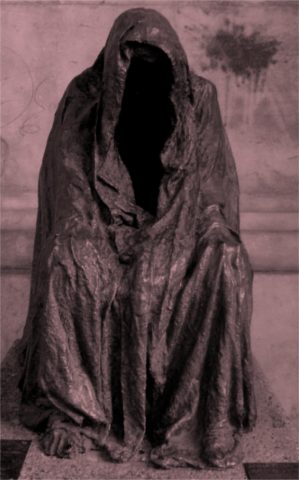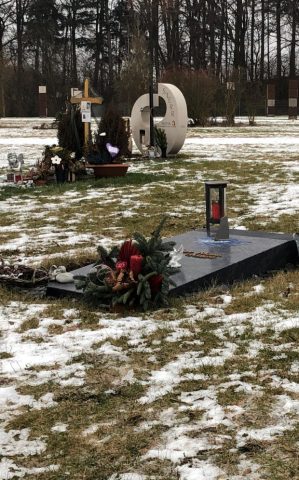This afternoon arrived with death. A 60 year old man had died and his cold and stiff body was taken out of the hearse in order to occupy one of the stretchers at the morgue in Bogotá.
The body would simply be the center of all sorts of procedures. Once the wake began, whoever went near the body would obtain the best impression of the deceased.
Death as a business
Pilar Duque was born in Medellin, Antioquia a little over 31 years ago. When she was 17 years old she decided to leave home, she made her bags and traveled to Bogotá, the capital city. She had no real work experience and she had finished high school a few months ago.
“At that moment the pain begins. For many people it doesn’t stop when the dirt falls over the coffin”, states the young woman who works at funeral processions.

Death as a business, that is something that many people don’t think about. It is an eternal subject, thorny, delicate and filled with dead end streets.
It is at this point when we come across the weepers; and it is important to note that in a country like ours death always pays the bills.
Just like the beautiful and stunning Egyptians, Duque flaunts the mourning. She is an essential part of the funeral cortege and with her presence she makes sure that others understand the level of importance the object of her tears had reached.
Pilar exhibits pain in different ways: through wailing, which in some occasions, and only if the family asks for it, may turn into a screaming frenzy and guilt. She also says that there are families who want an over the top dramatic funeral. This is why they ask her or some of her “co workers” to shake and pull their hair and cry for the corpse.
The purpose of a mourner or weeper is to show beyond doubt the sadness and deep heart wrenching pain due to the loss of a person.
The average price per mourner, weeper or funeral entourage costs around 97 USD (200 thousand pesos). This work entails to walk with the family and be near them at all times at the cemetery.
“It bothers me when people start saying that I have a displeasing and repulsive job and that I am mocking peoples pain. But there are others who actually prefer this line of work rather than selling their bodies for a little bit of cash.”
Duque knows that some of her relatives think that what she does is terribly wrong because a persons death should be portrayed as a sacred thing because that person is entering an eternal life.
Making ends meet
“ I am 31 years old and the truth is that I am thankful for a job that normally gives me enough money to eat, buy clothes, send money to my mom and even go out dancing.”
The work in Bogotá was perfect but she also needed to stretch money. At that moment on her life she lived with Maria Camila, a friend and co worker who she met at the first funeral home where she worked.
They spent most of the time together. At night, specially on Wednesdays they would go out dancing where many young people go to: Escobar y Rosa y Quiebra canto. “this party places are great. The music is good and the boys are really cute”, she confesses while giggling.

After a few years in the business, she decided it was time for a change of scenery. Because of that, she packed her bags once again “all I have fits in 3 suitcases of 20 kilos each”.

She applied for the Schengen Visa (at that moment in time Colombians still needed a Visa to travel to Europe) and as soon as it came true she traveled to Madrid. From that moment on, her entire world changed.
She also tells me that like all Colombians, the visa application process takes for ever, but since she had an aunt in Spain, she helped her with the family based immigrant visa and everything was a bit easier.
“I want to be famous, be in the movies and TV shows”. “ I never thought I would spend some time in Europe, it seemed so far a way, The English lesson did pay off after all.”
In the corner of her room there is a double bed with a purple bedspread, a 22 inch TV and a DVD player that she bought a few months ago. “I am here now and understanding TV shows in German is super difficult, it’s such a difficult language to learn, but I am here now.”, Pilar mentions in a timid manner.
Duque studied dramatic arts at the ASAB and took many English lessons because she wanted to become an international actress. And, this is still her dream because she believes she has what it takes.
Language lessons and work at the same time were very difficult to manage but for her work always came first because it was her means of support.
Rigoberto Salas, her employer for many years assures that when he first laid eyes on her, he never believed that a small, cute girl like her would be looking to get a job at a funeral home. “She is super responsible and is always willing to do any job. The only thing that she asks for is to be told in advance in order to get ready.”
Not a job for everyone
Not everyone can do this line of work. First of all, they only hire girls or women that don’t seem that old. They have to be good looking, it is better if they are curvaceous and well endowed, with gentle and nice facial expressions, put together and well dressed.
“In Medellin I had worked 2 or 3 times in this because I needed the money to pay for a surgery.” Surgery that she shows proudly when wearing V neck shirts and assures they help her get more work.
At the beginning of it all she felt distressed and nervous. The first day at the job she had to weep at a 22 year old funeral who had died in an unexpected manner.
“I remember that I was there with three other girls who had experience doing this. I never could have imagined that I was going to get so sad when surrounded by all those people. Furthermore, the mom of the guy who was being buried walked up to me and asked me if I knew him for a long time. I began crying even more so she would think that I was distraught and couldn’t speak!”
On this Tuesday afternoon Pilar is a bit sad, fatalistic and . It was, after all, her fathers and brothers death anniversary. She did not go to that funeral. She didn’t go because she could not bear the thought of seeing them laid to rest inside a coffin, lifeless.
Pilar thinks out loud, that she is one of the persons who has seen death up close and personal, this given that both her father and brother were killed when she was only 17 years old.
On that day, Pilar had come back from school a little bit earlier than usual and after doing her daily chores of cleaning the house and helping out with dinner she fell asleep in the living room chair, waiting as always, for her dad, Don Julio Duque, and her older brother, Cristobal.
Be that as it may, night arrived and the next morning there were no signs of them. They called her house and said the following “we killed them to even the score”.
“At that moment, my entire life changed because overnight I had to help my mom and I had to find any kind of job.”
After that, she had no other option than to confront an entire new world. She waited for a few months in order to finish school and decided to leave Medellín because either the memories would kill her or she would find revenge.

After that, she decided that she wouldn’t starve to death or that she wouldn’t return home defeated. This is why she began working as a mourner or weeper in that funeral home.

As its true for any job, it took a little bit getting used to the demands that this line of work entailed, which was no easy job.
In addition, being surrounded by people who where crying and a dead person, makes things more complicated than usual. “The thing is that crying for someone who you don’t know is not very typical… I won’t attend the funeral of a family member, no way!”, she declares with a paisa accent and a rasping voice.
Not all funeral homes are the same. In Medellín everyone knows that they can have access to a group of beautiful girls who can cry for a few hours at a funeral.
But, in Bogotá, the funeral homes in the northern part of the city reject this service, the funeral homes that are downtown and southern part of the city don’t give a second thought in hiring girls to offer a more complete service to their customers.
Before she decided to see the wonders of the world for herself, her day to day job consisted of “last minute things”.
“At the funeral home where I work, they tell us that we are supposed to make death a more human thing. To present it with a less despicable face.”
It worked as follows: The funeral home called Pilar as soon as they knew they needed her.
If she wasn’t there they would leave a message either on the answering machine or they would call her on her cell phone if it was extremely urgent. And, she waited patiently in her room until the phone rang.
“There was a point when I felt this job consumed me. It is as if I had become insensible, in this country every minute people are dying and I couldn’t take it anymore”. Those rainy days make funeral even worse. Rain makes more emphasis is a day of doom, of sorrow of loneliness.
Deaths scent
The fact of the matter is that when the subject of death comes up, it doesn’t last long. It gives us an uneasy feeling that lets us know that others will become jumpy, rattled and tensed.
“When death comes near us or a loved one, we realize that we had a purpose nad we ask ourselves about it.” claims Pilar assured because of personal experience.
It is important to emphasize the attitude and the work itself that people who work at funeral homes, as well as weepers or mourners have.

It isn’t a popular job. As a matter of fact, most people have no idea it even exists.
She spent many days between her school and funerals, it’s as if she was trying to avoid the scent of death.
She is unsure of how much time she will remain in Europe, although life is comfortable and there are many things to see, for her there is nothing like home (Colombia). Maybe she will go back to don Rigoberto’s funeral home… that is a sure income.
Fear is a common denominator in this line of work. “One face is all the faces, I am an orphan who’s father and brother were stolen“. We are troubled and twitchy by death and there has always been an unspoken agreement in which we only deal with it when it’s in our face. But no one can avoid thinking about it, once in a while, what would happen if they died today, tomorrow or in a while.


